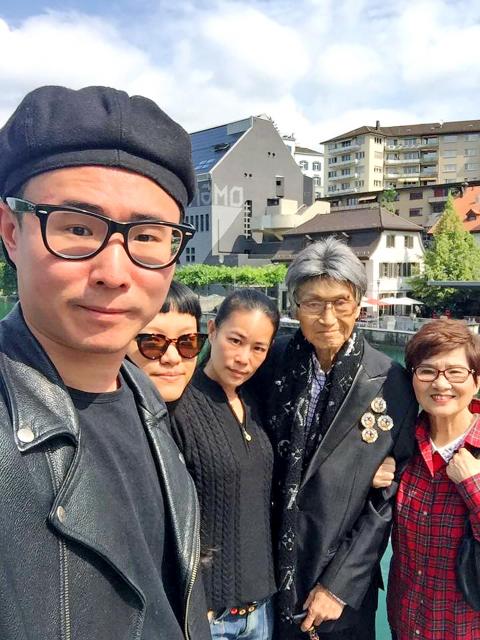Former sports commentator Fu Da-ren (傅達仁) yesterday underwent voluntary euthanasia at a Dignitas facility in Switzerland after deciding to end his life in a manner of his own choosing.
Fu, 85, had been diagnosed with terminal pancreatic cancer and had been pushing for Taiwan to allow euthanasia since 2016, but had turned to other organizations after making no headway in this nation.
Since his petition was approved by Dignitas last year, he had delayed the procedure eight times, but last month he traveled to Switzerland resolved to go through with the procedure.

Photo: screen grab from Facebook
Fu said he “was dying with dignity,” adding that his euthanasia would serve as a case study for the Taiwanese government and public so that they would treat the issue of euthanasia with the seriousness it deserves.
Just an hour before he entered the Dignitas facility, Fu updated his Facebook page, reminiscing about his life, as well as calling for the government to expedite the passage of a euthanasia act.
Fu was accompanied by his family members when the procedure was carried out.
Dignitas, which emphasizes the concept “to live with dignity, to die with dignity,” has helped more than 2,000 people end their life over the past two decades.
As Switzerland has not legalized euthanasia, the entire process is overseen by Swiss police and the body examined by coroners to ensure that there has been no criminal behavior, Dignitas said.
The Ministry of Health and Welfare yesterday said that the concept of euthanasia, or assisted suicide, is a contravention of the Criminal Code.
There is no domestic consensus on euthanasia, but the Patient Right to Autonomy Act (病人自主權利法), which is to promulgated on Jan. 6 next year, would serve to test the waters on the issue, the ministry said.
Under the act, which has been touted as the first of its kind in Asia, patients with five clinical conditions who have made an advance decision could have physicians partially or fully terminate, withdraw or withhold life-sustaining treatment, artificial nutrition and hydration in accordance with their advance decision.
The statutory conditions for such patients are that they are either terminally ill, in an irreversible coma, in a permanent vegetative state, suffering from severe dementia or another condition that is determined to be unbearable or incurable.
Additional reporting by Wu Liang-yi and CNA

MORE VISITORS: The Tourism Administration said that it is seeing positive prospects in its efforts to expand the tourism market in North America and Europe Taiwan has been ranked as the cheapest place in the world to travel to this year, based on a list recommended by NerdWallet. The San Francisco-based personal finance company said that Taiwan topped the list of 16 nations it chose for budget travelers because US tourists do not need visas and travelers can easily have a good meal for less than US$10. A bus ride in Taipei costs just under US$0.50, while subway rides start at US$0.60, the firm said, adding that public transportation in Taiwan is easy to navigate. The firm also called Taiwan a “food lover’s paradise,” citing inexpensive breakfast stalls

TRADE: A mandatory declaration of origin for manufactured goods bound for the US is to take effect on May 7 to block China from exploiting Taiwan’s trade channels All products manufactured in Taiwan and exported to the US must include a signed declaration of origin starting on May 7, the Bureau of Foreign Trade announced yesterday. US President Donald Trump on April 2 imposed a 32 percent tariff on imports from Taiwan, but one week later announced a 90-day pause on its implementation. However, a universal 10 percent tariff was immediately applied to most imports from around the world. On April 12, the Trump administration further exempted computers, smartphones and semiconductors from the new tariffs. In response, President William Lai’s (賴清德) administration has introduced a series of countermeasures to support affected

CROSS-STRAIT: The vast majority of Taiwanese support maintaining the ‘status quo,’ while concern is rising about Beijing’s influence operations More than eight out of 10 Taiwanese reject Beijing’s “one country, two systems” framework for cross-strait relations, according to a survey released by the Mainland Affairs Council (MAC) on Thursday. The MAC’s latest quarterly survey found that 84.4 percent of respondents opposed Beijing’s “one country, two systems” formula for handling cross-strait relations — a figure consistent with past polling. Over the past three years, opposition to the framework has remained high, ranging from a low of 83.6 percent in April 2023 to a peak of 89.6 percent in April last year. In the most recent poll, 82.5 percent also rejected China’s

PLUGGING HOLES: The amendments would bring the legislation in line with systems found in other countries such as Japan and the US, Legislator Chen Kuan-ting said Democratic Progressive Party (DPP) Legislator Chen Kuan-ting (陳冠廷) has proposed amending national security legislation amid a spate of espionage cases. Potential gaps in security vetting procedures for personnel with access to sensitive information prompted him to propose the amendments, which would introduce changes to Article 14 of the Classified National Security Information Protection Act (國家機密保護法), Chen said yesterday. The proposal, which aims to enhance interagency vetting procedures and reduce the risk of classified information leaks, would establish a comprehensive security clearance system in Taiwan, he said. The amendment would require character and loyalty checks for civil servants and intelligence personnel prior to